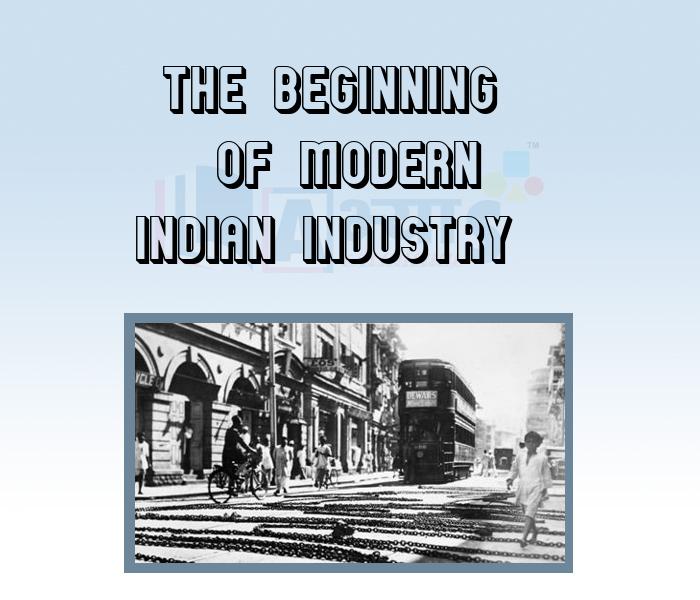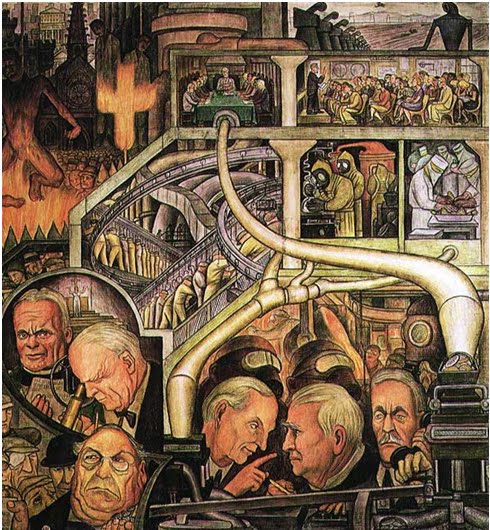The Beginning of Modern Indian Industry












The Beginning of Modern Indian Industry
In India, the modern industrial sector on an organised pattern started with the establishment of cotton textile industry in Bombay in 1854 with predominantly Indian capital and enterprise. In 1855, jute industry was started in the Hooghly valley at Rishra near Kolkata, largely with foreign capital and enterprise.
The Beginning of Modern Indian Industry: Large-scale industries required large-scale movement of raw materials and finished products. For this, modern and efficient means of transport and communication were needed. India lacked both. So the British started building roads and railways across the country, linking the places which were sources of raw materials with the places of manufacture and the places of consumption. Steam navigation along the rivers was developed. Post and telegraph were introduced to speed up communication. British money was largely invested in factories and mines.
British investors built jute factories in Calcutta and cotton mills in Kanpur. This was followed by metal works, coal mines and oil wells. When World War I broke out in 1914, Britain War importing part of its steel requirements from India .It realised the need to develop industries in India to supplement factories in Britain manufacturing n military equipments. Moreover it was becoming difficult to get their essential supplies from England due to the war. So the British were forced to start factories in 1ndia.
The country’s first large-scale industries were set up in the middle of the 19th century with Bombay being the centre.
The Vandemataram movement started by the extremist Congress leader Bal Gangadhar tilak included the programme of boycott of foreign goods and production of Swadeshi goods. This gave an impetus to start modern industries in India. During the two World Wars the British imports to India were not sufficient to meet the Indian demand.

Students / Parents Reviews [10]
It has a great methodology. Students here can get analysis to their test quickly.We can learn easily through PPTs and the testing methods are good. We know that where we have to practice

Barkha Arora
10thIt was a good experience with Abhyas Academy. I even faced problems in starting but slowly and steadily overcomed. Especially reasoning classes helped me a lot.

Cheshta
10thAbhyas Methodology is very good. It is based on according to student and each child manages accordingly to its properly. Methodology has improved the abilities of students to shine them in future.

Manish Kumar
10thIt was good as the experience because as we had come here we had been improved in a such envirnment created here.Extra is taught which is beneficial for future.

Eshan Arora
8thBeing a parent, I saw my daughter improvement in her studies by seeing a good result in all day to day compititive exam TMO, NSO, IEO etc and as well as studies. I have got a fruitful result from my daughter.

Prisha Gupta
8thAbout Abhyas metholodology the teachers are very nice and hardworking toward students.The Centre Head Mrs Anu Sethi is also a brilliant teacher.Abhyas has taught me how to overcome problems and has always taken my doubts and suppoeted me.

Shreya Shrivastava
8thMy experience with Abhyas is very good. I have learnt many things here like vedic maths and reasoning also. Teachers here first take our doubts and then there are assignments to verify our weak points.

Shivam Rana
7thI have spent a wonderful time in Abhyas academy. It has made my reasoning more apt, English more stronger and Maths an interesting subject for me. It has given me a habbit of self studying

Yatharthi Sharma
10thAbhyas is a complete education Institute. Here extreme care is taken by teacher with the help of regular exam. Extra classes also conducted by the institute, if the student is weak.

Om Umang
10thOne of the best institutes to develope a child interest in studies.Provides SST and English knowledge also unlike other institutes. Teachers are co operative and friendly online tests andPPT develope practical knowledge also.
